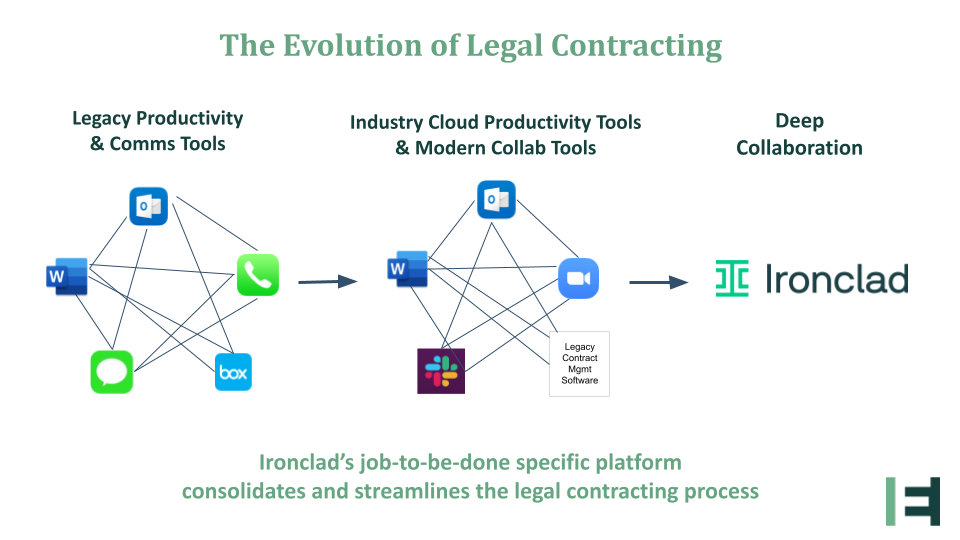Ironclad: The Future of Deep Collaboration for Contracting
Three months ago, I wrote about the arrival of Deep Collaboration. It’s what we call software that combines productivity and collaboration functionalities in one place to get a specific job done. Salesforce’s acquisition of Slack is a prime harbinger of the Deep Collaboration future—combining the sales tool and the collaboration functionality allows all the people involved in sales to focus in one place, without data or productivity loss.
Another area that’s ripe for Deep Collaboration, but has been long overlooked, is business contracting.
Contracts are the fiat currency of business, but there has been no centralized system for collaboration and job-specific workflows. As a result, legal teams spend countless hours juggling disconnected platforms, switching from redlining and collaborating on a legal document in Word to emailing multiple versions of the same document back and forth with internal stakeholders and counterparties to texting to Slacking, etc.
I’ve seen firsthand how this challenge causes important agreements to get delayed. On numerous occasions, I’ve seen companies miss their quarter because contracts were held up in internal legal processes. The process is disjointed, frustrating, and inefficient for everyone involved. Lawyers don’t want to be bottlenecks; they’ve lacked the tooling to improve the process.
This lack of centralization is not only a productivity problem but a risk management one. Approving an outdated version of a contract or sharing agreements with the wrong parties can be fatal mistakes for a business.
The legacy stack can’t solve this. Microsoft Word is the standard for contracting, even though it clearly wasn’t built for collaboration, nor is it specific to this job-to-be-done. Legacy contract management systems don’t improve this status quo; without embedded collaboration, workflows still look like a spaghetti of tool hopping, data loss, and frustration.

That’s why we’re so excited to see Ironclad usher in the Deep Collaboration era for contracts. Since we first invested, Ironclad has emerged as the one-stop-shop for all things contracts. Its new collaboration capabilities fuse the best aspects of generic collaboration tools (think @mentions, accept/reject tracked changes) with deep, contracts-specific workflows (e.g., permissioning, approvals). Users on any team can redline and revise contracts in the Ironclad Editor (the only Word-native, in-browser editor on the market), and when they’re done, send a DOCX copy to any counterparty—without ever leaving the software.
What this means is that the entire contracting experience is in one place, for everyone. Indeed, Ironclad has far more users in departments like HR, Sales, and Procurement than it does in the Legal function. It has become a pan-organization, job-to-be-done specific collaboration platform.
Ironclad is now expanding beyond an organization’s (virtual) walls to be the place in which counterparties collaborate. The mess of emails and versionitis grows exponentially when you include the external negotiation process. By solving the problem internally, Ironclad is the logical platform to tackle this problem cross-organizationally.
Just as in sales, the opportunity for Deep Collaboration in contracting is tremendous—and we’re only getting an initial glimpse. I expect Ironclad will serve as a model to many emerging Deep Collaboration companies tackling a variety of jobs-to-be-done. Onward!
Enjoying this article?
Sign up to gain access to our thought leadership and have future articles delivered directly to your email.